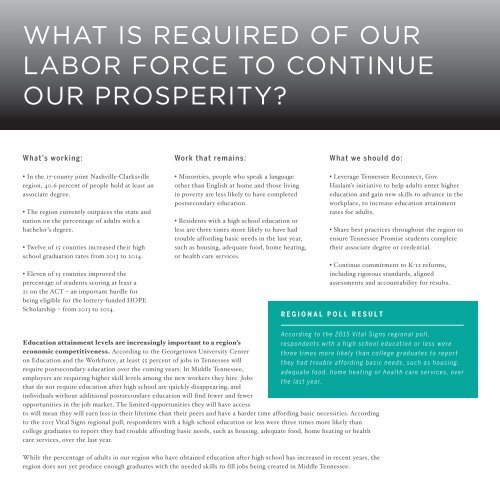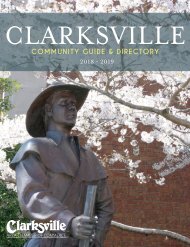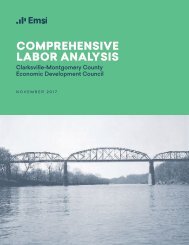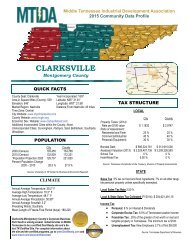vital_signs_2015_web
You also want an ePaper? Increase the reach of your titles
YUMPU automatically turns print PDFs into web optimized ePapers that Google loves.
WHAT IS REQUIRED OF OUR<br />
LABOR FORCE TO CONTINUE<br />
OUR PROSPERITY?<br />
What’s working:<br />
Work that remains:<br />
What we should do:<br />
• In the 17-county joint Nashville-Clarksville<br />
region, 40.6 percent of people hold at least an<br />
associate degree.<br />
• The region currently outpaces the state and<br />
nation on the percentage of adults with a<br />
bachelor’s degree.<br />
• Twelve of 15 counties increased their high<br />
school graduation rates from 2013 to 2014.<br />
• Eleven of 15 counties improved the<br />
percentage of students scoring at least a<br />
21 on the ACT – an important hurdle for<br />
being eligible for the lottery-funded HOPE<br />
Scholarship – from 2013 to 2014.<br />
• Minorities, people who speak a language<br />
other than English at home and those living<br />
in poverty are less likely to have completed<br />
postsecondary education.<br />
• Residents with a high school education or<br />
less are three times more likely to have had<br />
trouble affording basic needs in the last year,<br />
such as housing, adequate food, home heating,<br />
or health care services.<br />
• Leverage Tennessee Reconnect, Gov.<br />
Haslam’s initiative to help adults enter higher<br />
education and gain new skills to advance in the<br />
workplace, to increase education attainment<br />
rates for adults.<br />
• Share best practices throughout the region to<br />
ensure Tennessee Promise students complete<br />
their associate degree or credential.<br />
• Continue commitment to K-12 reforms,<br />
including rigorous standards, aligned<br />
assessments and accountability for results.<br />
REGIONAL POLL RESULT<br />
According to the <strong>2015</strong> Vital Signs regional poll,<br />
Education attainment levels are increasingly important to a region’s<br />
respondents with a high school education or less were<br />
economic competitiveness. According to the Georgetown University Center<br />
three times more likely than college graduates to report<br />
on Education and the Workforce, at least 55 percent of jobs in Tennessee will<br />
they had trouble affording basic needs, such as housing,<br />
require postsecondary education over the coming years. In Middle Tennessee,<br />
adequate food, home heating or health care services, over<br />
employers are requiring higher skill levels among the new workers they hire. Jobs<br />
the last year.<br />
that do not require education after high school are quickly disappearing, and<br />
individuals without additional postsecondary education will find fewer and fewer<br />
opportunities in the job market. The limited opportunities they will have access<br />
to will mean they will earn less in their lifetime than their peers and have a harder time affording basic necessities. According<br />
to the <strong>2015</strong> Vital Signs regional poll, respondents with a high school education or less were three times more likely than<br />
college graduates to report they had trouble affording basic needs, such as housing, adequate food, home heating or health<br />
care services, over the last year.<br />
While the percentage of adults in our region who have obtained education after high school has increased in recent years, the<br />
region does not yet produce enough graduates with the needed skills to fill jobs being created in Middle Tennessee.












